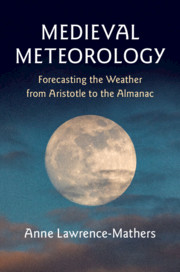Book contents
- Medieval Meteorology
- Medieval Meteorology
- Copyright page
- Contents
- Preface
- Acknowledgements
- Introduction
- 1 Recreating Meteorology in the Early Middle Ages
- 2 Meteorology, Weather Forecasting and the Early Medieval Renaissance of Astronomy
- 3 Exploratory Encounters with the Work of Arab Astronomers and Meteorologists
- 4 Meteorology, the New Science of the Stars and the Rise of Weather Forecasting
- 5 The Contested Rise of Astrometeorology
- 6 Applying the Science of Astrometeorology
- 7 Astrometeorology and Mechanisation
- 8 Weather Forecasting and the Impact of Print
- Conclusion
- Bibliography
- Index
Conclusion
The Afterlife of Medieval Meteorology
Published online by Cambridge University Press: 08 November 2019
- Medieval Meteorology
- Medieval Meteorology
- Copyright page
- Contents
- Preface
- Acknowledgements
- Introduction
- 1 Recreating Meteorology in the Early Middle Ages
- 2 Meteorology, Weather Forecasting and the Early Medieval Renaissance of Astronomy
- 3 Exploratory Encounters with the Work of Arab Astronomers and Meteorologists
- 4 Meteorology, the New Science of the Stars and the Rise of Weather Forecasting
- 5 The Contested Rise of Astrometeorology
- 6 Applying the Science of Astrometeorology
- 7 Astrometeorology and Mechanisation
- 8 Weather Forecasting and the Impact of Print
- Conclusion
- Bibliography
- Index
Summary
The Conclusion traces the importance of astrometeorological forecasts from the seventeenth century onwards. It finds surprising evidence that they finally disappeared only in the nineteenth century, despite increasing criticism. In fact, one of the attackers mourned the continuing high sales of Moore’s almanac in the 1830s. A central finding is that the increasing rejection of astrology in the eighteenth century, and the attacks on astrometeorology, led to the absence of any accepted basis for making weather forecasts. This problem, together with ongoing demand for knowledge of coming weather, led to the revival of old-fashioned weather-signs. The support given by Tycho Brahe and Johannes Kepler to both astrometeorology and the keeping of waether records is considered, as are early modern treatises on weather prediction. A detailed study of English 18th-century almanacs shows use of weather journals and instruments such as barometers, alongside traditional astrometeorological methods. The final conclusion is that it was only the production of FitzRoy’s new, ‘practical’ system of forecasting the weather that finally ended the age of medieval meteorology.
Keywords
- Type
- Chapter
- Information
- Medieval MeteorologyForecasting the Weather from Aristotle to the Almanac, pp. 194 - 202Publisher: Cambridge University PressPrint publication year: 2019

